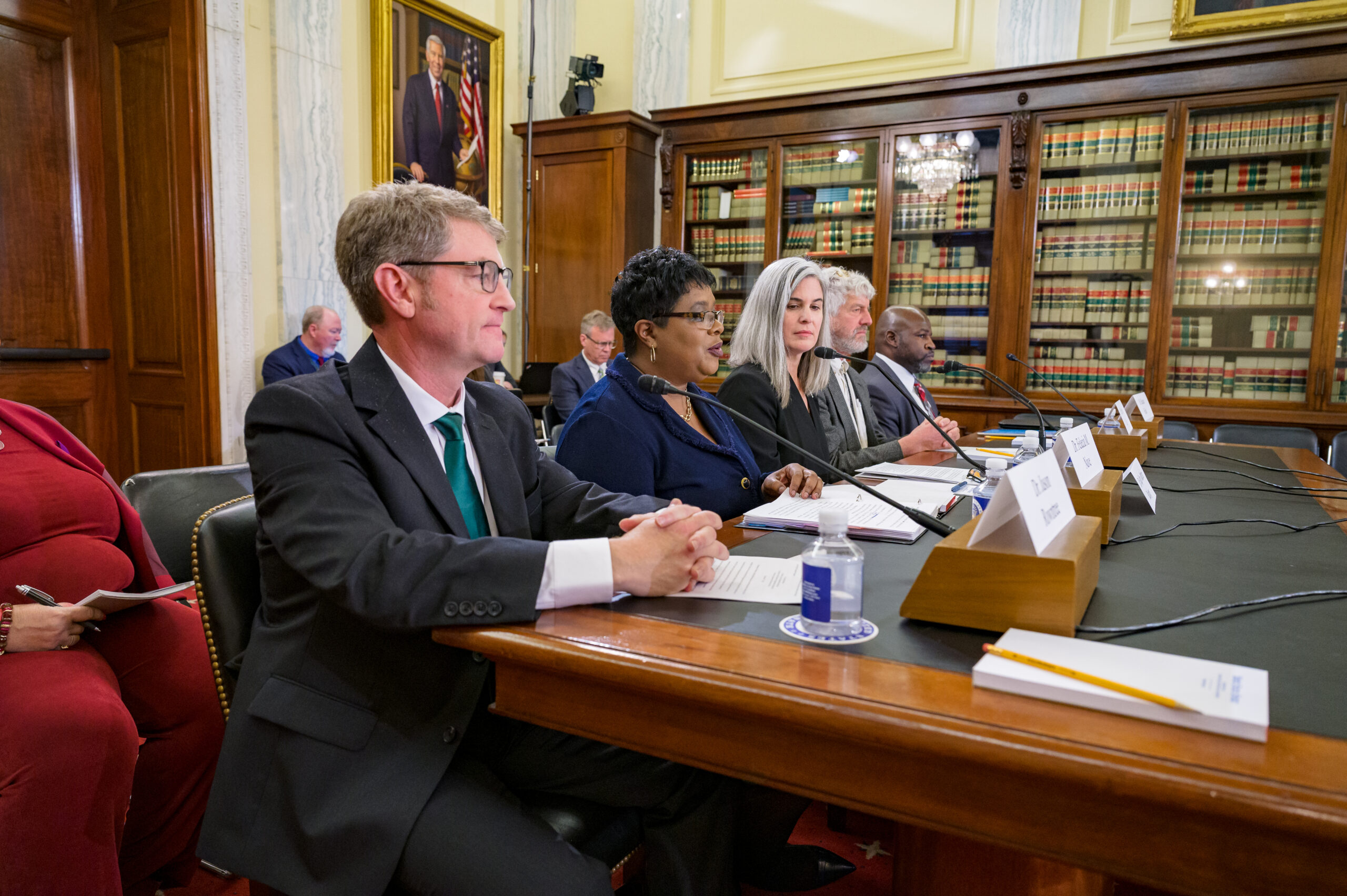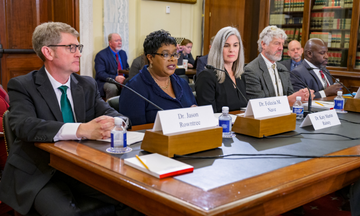Alcorn president testifies before the Senate Committee on Agriculture, Nutrition, and Forestry
Last week, the Senate Committee on Agriculture, Nutrition, and Forestry held a hearing for research programs in the next farm bill.
Dr. Felecia M. Nave, president of Alcorn State University, provided testimony on behalf of the Executive Committee of the 1890 Council of Presidents.

The agriculture and nutrition legislative package known as the Farm Bill is up for reauthorization in 2023, allowing Congress to reassess various research programs sponsored through the legislation. Under the 2018 version of the Farm Bill, priority areas for research funding included agriculture technology, bioenergy, animal health, and plant health.
Her testimony outlined the 1890 land-grant system, its impact on the world, and the resources needed to advance the work of 1890 universities.
Through legislative support, the 1890s have been able to grant opportunities in various areas, including “educational attainment, economic prosperity and health of the families, businesses, and communities,” said Nave. “The impacts are significant, and the positive outcomes for the communities we serve, and the nation, are even greater.”
As the first public land-grant HBCU, Alcorn is uniquely positioned through its connection to both Morrill Acts. In 1862, U.S. Senator Justin Morrill developed the Act to set aside federal land to establish land-grant institutions to benefit agricultural and mechanical arts. The Act was expanded in 1890 to implement regular appropriations to support the institutions.
“Founded in 1871, Alcorn State University traces its heritage back to the 1862 and 1890 Morrill Acts,” said Nave. “It is the only HBCU founded with a land-grant purpose after the first Morrill Act, making it America’s oldest public historically black land-grant institution. Alcorn is also Mississippi’s second oldest state-supported university.”

Dr. Nave highlighted the outreach efforts of the 1890s as its work to educate minorities and socio-economically disadvantaged communities to aid in the development and growth of the community.
“As such, the future of agriculture is intrinsically intertwined with the future of the 1890 land-grant institutions,” said Nave. “The 2023 Farm Bill presents an excellent opportunity to build on key gains for the 1890s that were included in the 2018 Farm Bill. It is also an opportunity to increase financial support in critical growth areas. These scale initiatives have proven to be effective and successful and address other areas of significance to the 1890 community, like the impacts of climate change and its impact on communities of color.”
Alcorn’s federally funded Socially Disadvantaged Farmers and Ranchers Policy Research Center (SDFR) was authorized by the 2014 Farm Bill through the assistance of U.S. Congressman Bennie G. Thompson and other congressmen. SDFR was created to be a voice for socially disadvantaged farmers and ranchers and ensure data-driven information is available for Congress and other stakeholders. It was created as a vehicle for minority farmers to assist in developing agricultural policies that affect their livelihoods.
Many 1890 universities offer Extension Programs to the community, which work to improve agricultural processes and strengthen families and communities.
“There is a great need for increased investment to grow the footprint and outreach of the extension agents at the 1890s. These agents are embedded in our communities and serve as boots on the ground. With more resources, our agents would be able to help more communities.
As rural areas struggle with brain drain, with increased funding, 1890 Universities can assist with economic development opportunities to build up communities surrounding the institutions.
“We train our students for jobs and careers, and many of them have to leave our communities to find them,” said Nave. “As we look to the 2023 Farm Bill, the 1890 Universities would like to work with Congress and this committee to find ways, through the USDA Rural Development Agency, to bring economic development opportunities to the surrounding areas of our schools. The goal would be to create meaningful job prospects for our students to consider working and living in the communities we serve.”
Funding to improve the infrastructure and equipment will allow the 1890 Universities to strengthen the institutions’ research capacity.
“Similarly, on our main campuses and extension facilities, we need resources to upgrade and repair our facilities,” said Nave. “In October, I joined over 80 of my fellow HBCU presidents and chancellors in sending a letter to House and Senate leadership asking them to prioritize Senator Chris Coons’ and Senator Tim Scott’s IGNITE infrastructure legislation. For many decades, the infrastructure at our universities has been underfunded by billions of dollars. This bipartisan and bicameral bill would help provide students with state-of-the-art research laboratories, reliable high-speed internet access, and adequate housing.”
In her closing comments, Dr. Nave stressed the importance of technology to advance the field of agriculture.
“Artificial intelligence, drone technology, and vertical farming are a few of the emerging fields in sustainable agriculture that 1890 students and researchers are capable and prepared to contribute to the advancement of science in strengthening the nation’s agricultural landscape. However, for our institutions to remain competitive in these emerging areas, increased funding is required to support the modernization and expansion of our research and technology infrastructure and build capacity.”
The sole witness on the first panel appearing at this hearing was the Honorable Chavonda Jacobs-Young, Under Secretary for Research, Education, and Economics, U.S. Department of Agriculture.
Other witnesses on the hearing’s second panel included Dr. Jason Rowntree, CS Mott Chair of Sustainable Agriculture, Director, MSU Center for Regenerative Agriculture, and Professor, Michigan State University; Dr. Katy Rainey, Associate Professor, Purdue Soybean Center, Purdue University; Steve Ela, Partner and Manager, Ela Family Farms; and Dr. Deacue Fields, Vice President for Agriculture, University of Arkansas System Division of Agriculture.
The hearing and Dr. Nave’s testimony transcript can be viewed at this link.




